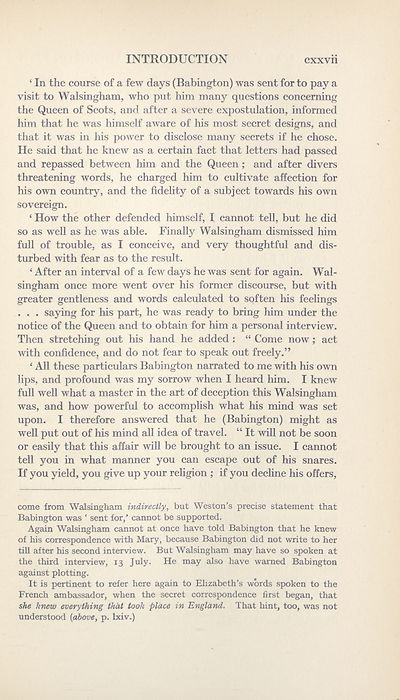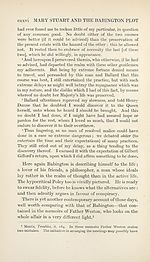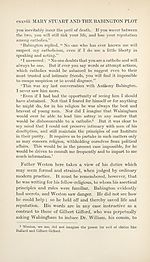Series 3 > Mary Queen of Scots and the Babington plot
(132) Page cxxvii
Download files
Complete book:
Individual page:
Thumbnail gallery: Grid view | List view

INTRODUCTION
cxxvh
‘ In the course of a few days (Babington) was sent for to pay a
visit to Walsingham, who put him many questions concerning
the Queen of Scots, and after a severe expostulation, informed
him that he was himself aware of his most secret designs, and
that it was in his power to disclose many secrets if he chose.
He said that he knew as a certain fact that letters had passed
and repassed between him and the Queen; and after divers
threatening words, he charged him to cultivate affection for
his own country, and the fidelity of a subject towards his own
sovereign.
‘ How the other defended himself, I cannot tell, but he did
so as well as he was able. Finally Walsingham dismissed him
full of trouble, as I conceive, and very thoughtful and dis¬
turbed with fear as to the result.
‘ After an interval of a few days he was sent for again. Wal¬
singham once more went over his former discourse, but with
greater gentleness and words calculated to soften his feelings
. . . saying for his part, he was ready to bring him under the
notice of the Queen and to obtain for him a personal interview.
Then stretching out his hand he added: “ Come now; act
with confidence, and do not fear to speak out freely.”
‘ All these particulars Babington narrated to me with his own
lips, and profound was my sorrow when I heard him. I knew
full well what a master in the art of deception this Walsingham
was, and how powerful to accomplish what his mind was set
upon. I therefore answered that he (Babington) might as
well put out of his mind all idea of travel. “ It will not be soon
or easily that this affair will be brought to an issue. I cannot
tell you in what manner you can escape out of his snares.
If you yield, you give up your religion ; if you decline his offers,
come from Walsingham indirectly, but Weston’s precise statement that
Babington was ‘ sent for,’ cannot be supported.
Again Walsingham cannot at once have told Babington that he knew
of his correspondence with Mary, because Babington did not write to her
till after his second interview. But Walsingham may have so spoken at
the third interview, 13 July. He may also have warned Babington
against plotting.
It is pertinent to refer here again to Ehzabeth’s words spoken to the
French ambassador, when the secret correspondence first began, that
she knew everything that took place in England. That hint, too, was not
understood [above, p. Ixiv.)
cxxvh
‘ In the course of a few days (Babington) was sent for to pay a
visit to Walsingham, who put him many questions concerning
the Queen of Scots, and after a severe expostulation, informed
him that he was himself aware of his most secret designs, and
that it was in his power to disclose many secrets if he chose.
He said that he knew as a certain fact that letters had passed
and repassed between him and the Queen; and after divers
threatening words, he charged him to cultivate affection for
his own country, and the fidelity of a subject towards his own
sovereign.
‘ How the other defended himself, I cannot tell, but he did
so as well as he was able. Finally Walsingham dismissed him
full of trouble, as I conceive, and very thoughtful and dis¬
turbed with fear as to the result.
‘ After an interval of a few days he was sent for again. Wal¬
singham once more went over his former discourse, but with
greater gentleness and words calculated to soften his feelings
. . . saying for his part, he was ready to bring him under the
notice of the Queen and to obtain for him a personal interview.
Then stretching out his hand he added: “ Come now; act
with confidence, and do not fear to speak out freely.”
‘ All these particulars Babington narrated to me with his own
lips, and profound was my sorrow when I heard him. I knew
full well what a master in the art of deception this Walsingham
was, and how powerful to accomplish what his mind was set
upon. I therefore answered that he (Babington) might as
well put out of his mind all idea of travel. “ It will not be soon
or easily that this affair will be brought to an issue. I cannot
tell you in what manner you can escape out of his snares.
If you yield, you give up your religion ; if you decline his offers,
come from Walsingham indirectly, but Weston’s precise statement that
Babington was ‘ sent for,’ cannot be supported.
Again Walsingham cannot at once have told Babington that he knew
of his correspondence with Mary, because Babington did not write to her
till after his second interview. But Walsingham may have so spoken at
the third interview, 13 July. He may also have warned Babington
against plotting.
It is pertinent to refer here again to Ehzabeth’s words spoken to the
French ambassador, when the secret correspondence first began, that
she knew everything that took place in England. That hint, too, was not
understood [above, p. Ixiv.)
Set display mode to:
![]() Universal Viewer |
Universal Viewer | ![]() Mirador |
Large image | Transcription
Mirador |
Large image | Transcription
Images and transcriptions on this page, including medium image downloads, may be used under the Creative Commons Attribution 4.0 International Licence unless otherwise stated. ![]()
| Scottish History Society volumes > Series 3 > Mary Queen of Scots and the Babington plot > (132) Page cxxvii |
|---|
| Permanent URL | https://digital.nls.uk/127235625 |
|---|
| Attribution and copyright: |
|
|---|
| Description | Over 180 volumes, published by the Scottish History Society, containing original sources on Scotland's history and people. With a wide range of subjects, the books collectively cover all periods from the 12th to 20th centuries, and reflect changing trends in Scottish history. Sources are accompanied by scholarly interpretation, references and bibliographies. Volumes are usually published annually, and more digitised volumes will be added as they become available. |
|---|


